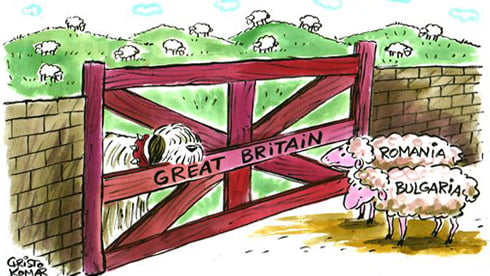 From January 1st 2014, Bulgarians and Romanians have free movement within Europe’s labour market, having waited seven years for the freedom to move under the terms of accession. As a result, it is likely that a wave of immigration from these countries will hit members of the European Union, including the UK.
From January 1st 2014, Bulgarians and Romanians have free movement within Europe’s labour market, having waited seven years for the freedom to move under the terms of accession. As a result, it is likely that a wave of immigration from these countries will hit members of the European Union, including the UK.
Welfare tourism
Reactions to the lifting of the ban are mixed. Some experts believe thousands of immigrants from the two countries will turn to the UK in search of jobs and monetary benefits-the latter being dubbed ‘welfare tourism’. Prime Minister David Cameron, for instance, has already announced plans to cap social services for immigrants to Britain from other countries. Consequently, Romanian and Bulgarian immigrants could be subject to these restrictions.
Other countries like France and Germany are also taking precautions. Marine Le Pen of extreme right political party Front National (FN) is using a potential influx of immigrants to rally support, claiming local people are already suffering from mass unemployment without citizens from other countries taking jobs in the country. In addition, as Romanians and Bulgarians are already permitted to work in Germany if they have a skill, German politicians are worried about unskilled immigrants permanently moving to the country.
Quality of life
However, other immigrants could head to the UK in search of a better life, overlooking the exploitation of the benefits system. Many immigrants have actually by-passed the restrictions by declaring themselves self-employed and finding construction jobs, for instance, showcasing their vision to work hard for an improved quality of life in the UK. Who is to say that, when the ban is lifted in 2014, other workers will not come to the UK to ply their trade instead of looking for financial benefits?
In addition, Bulgarian foreign minister Nikolay Mladenov believes that UK may not actually be a hotspot for immigrants, considering the stronger business links Bulgaria has with Germany, Spain and Italy.
He cites figures showing Bulgaria’s accession to the EU hasn’t sent mass waves of Bulgarians to other European countries illegally, other than a few issues at the start of the accession in 2007. In addition, as Bulgaria has a number of companies working in other EU countries, the UK may not be the first choice for immigrants regardless.
Beneficial
Moreover, if immigrants do decide to head to the UK, it may be beneficial to the UK, according to the minister. As immigration has always been beneficial to the UK economy, it could help with job creation and economic prosperity, which would help turn Romanian and Bulgarian immigration into a positive issue.
Back in 2004, Germany became worried that Polish immigration would drive German tradesman into the ground but it has helped the country. Ultimately, the worry and debate surrounding the issue became a symbol of xenophobia and Poland prospered by encouraging foreign firms to invest in the country.
Overall, past trends and expert analysis point to the UK avoiding a tremendous influx in Romanian and Bulgarian immigrants. However, until the ban is lifted in January 2014, the UK won’t know the full impact of the free movement of immigrants from these countries.
Chris Taylor is a brand journalist based in the UK and contributes this post on behalf of expert London immigration solicitors Adams Law. What will really happen when these two countries join the EU? Only time will tell.







